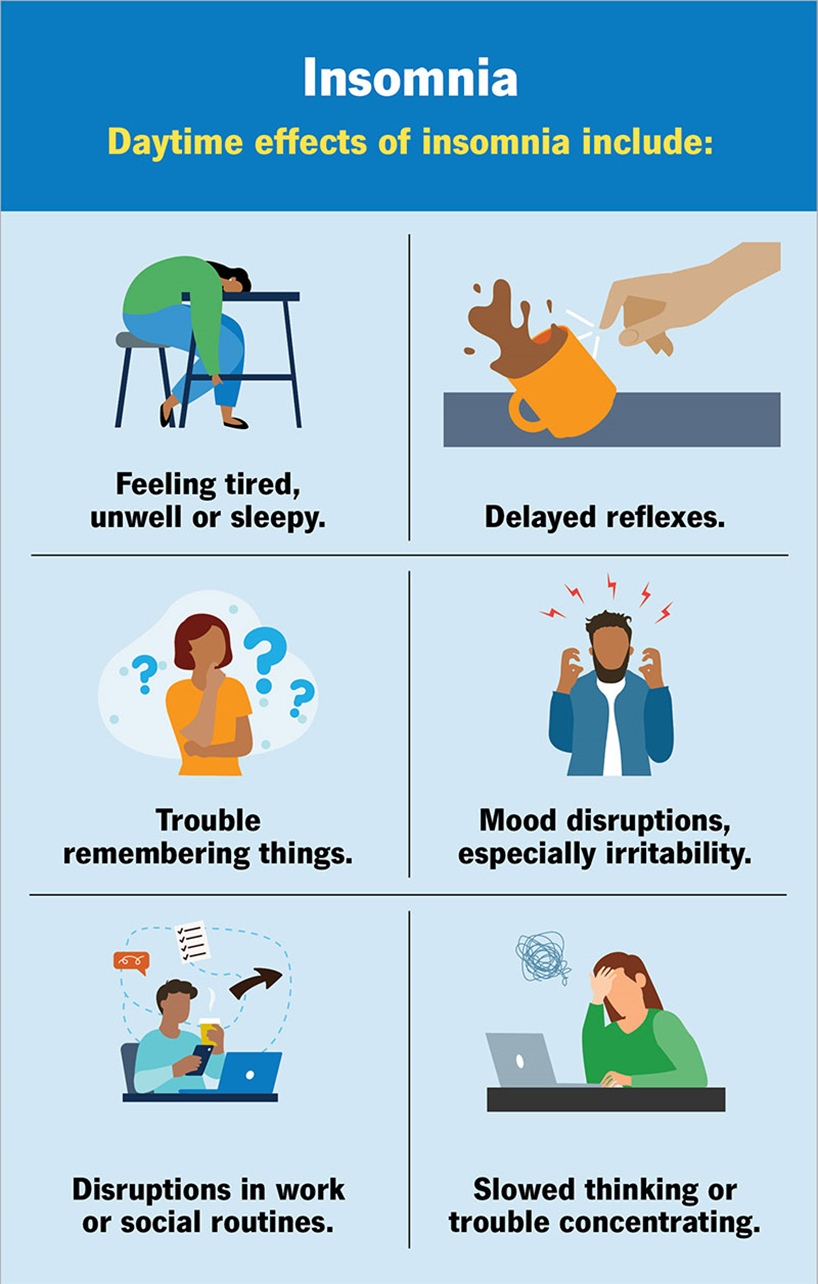A nurse is assessing a client who has chronic insomnia. Which question would address the highest safety priority for the client?
When did you begin to have trouble sleeping?
Are there any specific factors that you think are affecting your ability to sleep?
Do you have difficulty staying awake when you are driving?
Can you describe your bedtime routine to me?
The Correct Answer is C
Choice A Reason:
Asking “When did you begin to have trouble sleeping?” is important for understanding the onset and duration of the client’s insomnia. However, it does not directly address immediate safety concerns. Chronic insomnia can lead to significant daytime impairment, but the question about the onset of sleep troubles does not identify specific safety risks.
Choice B Reason:
Inquiring about specific factors affecting the client’s ability to sleep can help identify potential causes of insomnia, such as stress, environmental factors, or medical conditions. While this information is valuable for treatment planning, it does not directly address immediate safety concerns.
Choice C Reason:
Asking “Do you have difficulty staying awake when you are driving?” addresses the highest safety priority. Chronic insomnia can lead to excessive daytime sleepiness, which significantly increases the risk of accidents, especially while driving. Identifying whether the client is at risk of falling asleep during potentially dangerous activities is crucial for immediate safety.

Choice D Reason:
Understanding the client’s bedtime routine can provide insights into their sleep hygiene and habits, which are important for managing insomnia. However, this question does not directly address immediate safety concerns related to daytime functioning and the risk of accidents.
Nursing Test Bank
Naxlex Comprehensive Predictor Exams
Related Questions
Correct Answer is A
Explanation
Choice A reason: Positioning the collection device below the level of the chest is crucial to ensure proper drainage of air or fluid from the pleural space. This positioning uses gravity to facilitate drainage and prevent backflow into the pleural cavity, which could lead to complications such as pneumothorax or pleural effusion. The collection device should always be kept below the chest level to maintain effective drainage.
Choice B reason: Clamping the chest tube is generally not recommended unless specifically ordered by a physician or during certain procedures. Clamping can lead to a buildup of air or fluid in the pleural space, increasing the risk of tension pneumothorax. It is essential to keep the chest tube unclamped to allow continuous drainage and prevent complications.
Choice C reason: Applying an occlusive dressing over the chest tube site is necessary to prevent air from entering the pleural space and to secure the tube. However, this is not the primary action related to the positioning of the collection device. The occlusive dressing helps maintain the integrity of the chest tube insertion site and prevents infection.
Choice D reason: Emptying the chest tube collection chamber every shift is not a standard practice. The collection chamber should be monitored and emptied as needed based on the volume of drainage and the specific protocols of the healthcare facility. Regular monitoring is essential, but unnecessary emptying can disrupt the closed system and increase the risk of infection.
Correct Answer is C
Explanation
Choice A Reason:
Alginate dressings are typically used for wounds with moderate to heavy exudate because they are highly absorbent. Stage I pressure ulcers do not usually produce exudate, making alginate dressings unnecessary and inappropriate for this type of wound.
Choice B Reason:
Hydrogel dressings are designed to provide moisture to dry wounds and are more suitable for wounds with minimal to no exudate. While they can be used for stage I pressure ulcers, they are not the most common choice as these ulcers do not typically require additional moisture.
Choice C Reason:
Transparent dressings are ideal for stage I pressure ulcers because they protect the skin from friction and shear while allowing for continuous observation of the wound. These dressings maintain a moist environment, which is beneficial for healing, and are easy to apply and remove without causing additional trauma to the skin.

Choice D Reason:
Wet-to-dry gauze dressings are generally used for debridement of necrotic tissue in more advanced wounds. They are not suitable for stage I pressure ulcers, which do not have necrotic tissue and do not require debridement.
Whether you are a student looking to ace your exams or a practicing nurse seeking to enhance your expertise , our nursing education contents will empower you with the confidence and competence to make a difference in the lives of patients and become a respected leader in the healthcare field.
Visit Naxlex, invest in your future and unlock endless possibilities with our unparalleled nursing education contents today
Report Wrong Answer on the Current Question
Do you disagree with the answer? If yes, what is your expected answer? Explain.
Kindly be descriptive with the issue you are facing.
